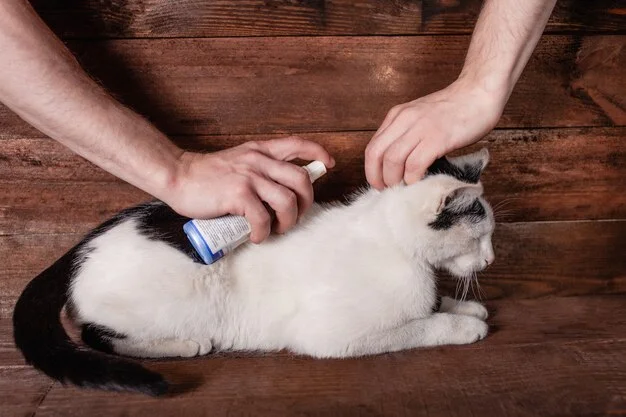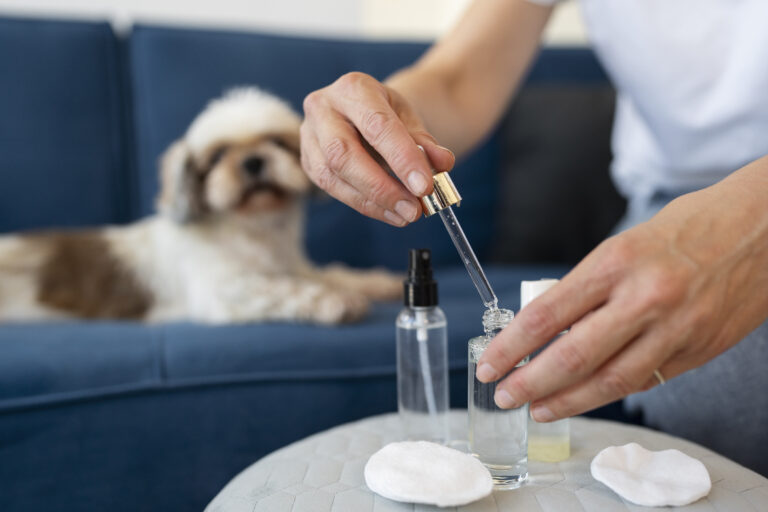Best Flea Treatment for Cats: Caring for Your Pet in 2025
Fleas are not simply annoying insects causing discomfort; they pose significant risks to your cat’s well-being. If not controlled, fleas can result in skin reactions, allergies, and, in worse cases, anemia. Here are the most comprehensive lists of the best flea treatments for cats that will provide your cat the safety and happiness it needs while avoiding harm from these tiny nasty bugs.

Quick Comparison Table: Best Flea Treatments for Cats
| Product Name | Type | Duration | Key Benefits | Best For |
|---|---|---|---|---|
| Frontline Plus Cats | Spot-On Treatment | 1 Month | Kills fleas, ticks, and lice | Multi-parasite protection |
| Capstar Oral Tablets | Oral Medication | Immediate | Fast-acting flea removal | Severe infestations |
| Seresto Cat Collar | Flea Collar | 8 Months | Long-lasting, low-maintenance | Extended flea prevention |
| Adams Plus Flea Shampoo | Shampoo | Immediate | Kills fleas, conditions fur | Quick relief for infestations |
| Vet’s Best Flea Spray | Spray | Variable | Plant-based, safe for homes | Natural flea prevention |
Why Can Flea Treatment Be Important for Cats?
However, if not taken cautioned, fleas are more than just a simple nuisance. Fleas can cause:
- Flea Allergy Dermatitis (FAD): A skin disease that is an allergic response to the saliva of fleas and results in pain.
- Tapeworms: Tapeworm eggs are also believed to be transmitted from fleas to cats through grooming.
- Anemia: There may be serious hemorrhages, usually in kittens, in case of intensive infestation.
- Household Infestations: Not only do fleas remain on your cat, but they also jump onto bedding, carpets, and furniture.
Applying the best flea treatment for cats is very important for the well-being of the cat as well as for the sanitation of the house.
Types of Flea Treatment for Cats
There are many kinds of flea treatments out there, ranging from homeopathic to prescription ones. Here’s what you need to know:
1. Topical Treatments (Spot-On)
Topical treatments are administered on the skin and most commonly on your cat’s coat usually at the back between the shoulder blades.
- Benefits: Is effective for one month and feels fleas on sight.
- Best Option: This excellent product offers multi-parasite protection and is Frontline Plus for Cats.
- Ideal For: Horses that do not like their mouth to be touched.
2. Oral Medications
Oral flea controllers are flea tablets or pills to be administered orally to dogs or cats.
- Benefits: Kills fleas within 24 hours of first application.
- Best Option: Fleas are dealt with effectively in the first instance, giving your pet prompt comfort when the Capstar Oral Tablets are administered.
- Ideal For: Flea infestation that cannot wait to be controlled.
3. Flea Collars
Flea collars are based on your cat’s neck, and the active ingredients in them are released slowly into the cat’s coat.
- Benefits: Easy to use and effective, usually offering protection for up to 8 months.
- Best Option: Seresto Cat Collar is an easy-to-use method of flea control while lasting for a long period of time.
- Ideal For: Some of the cats that require constant protection.
4. Flea Shampoos
Flea shampoos give relief instantly since fleas are eradicated when in contact with the water during washing.
- Benefits: Effectively removes flea eggs and larvae from your cat’s body while at the same time grooming the fur.
- Best Option: Adams Plus Flea Shampoo can be used on cats with sensitive skin because it is safe for their use.
- Ideal For: Temporary resolution or severe infections.
5. Flea Sprays
To eliminate fleas on your cat and also in their surroundings, you can use flea sprays on your cat.
- Benefits: Versatile and eco-friendly.
- Best Option: Vet’s Best Flea Spray’s ingredients are safe for homes and cats and contain no evils and toxins.
- Ideal For: Natural flea prevention.
How to Select the Most Effective Flea Product to Use on Cats
Selecting the best flea treatment for cats depends on several factors:
1. Your Cat’s Lifestyle
Indoor Cats: In less severe cases, what may be needed are only colony, spray, or shampoo solutions.
Outdoor Cats: Flea combs should not be used; instead, stay with stronger and long-lasting types of flea collars or topical products.
2. Weight and Age
Check that the product corresponds to your cat’s weight and that it is suitable for kittens if necessary. Most treatments are contraindicated in cats that are less than 8 weeks of age.
3. Severity of Infestation
If your pet has a severe infestation, it is recommended to try initial rapid-acting treatment such as tablets with flea adulticides, followed by purchasing a collar going forward.
4. Skin Sensitivities
If your cat is allergic or has skin issues, it’s best to use plant-based or hypoallergenic products.
How to Prevent Cats from Getting Fleas
This means that you simply don’t want the requirements for fleas in the first place. Here are some tips to keep your cat and home flea-free:
Regular Grooming: Cats need to be brushed so that fleas are easily noticeable, especially if they are still in their early stages.
Clean Your Home: Sweep and wash carpets, wash bedding, and fog furniture for flea eggs and larvae.
Yard Maintenance: Ensure that rooms that provide access to the outside environment are always clean so as to minimize the breeding of fleas.
Use Preventive Treatments: To prevent infestations, the cat owner must become consistent with the best flea treatment for cats.
FAQs
1. What are the signs of fleas in a cat?
When choosing the right preventive care, be aware of symptoms like licking and scratching, especially if there are raised red bumps or black grains (flea dirt on your cat’s coat).
2. Flea treatment: Can they be used on kittens?
Yes, fleas are transmittable from mother to kittens, but make sure the product that you are using is kitten-safe. Many of these are for cats eight weeks of age and older and should not be used in kittens as they are toxic to them.
3. How effective are natural treatments for fleas?
Natural remedies such as soaking plants in water and using neem or other plant-based products can be effective for mild infestations but may not support heavy infestations.
4. Should indoor cats be given flea treatments?
Absolutely! Fleas can also invade your home through other pets you may host or people that visit you or via your clothing, among other things.
5. Is it possible to mix various flea treatments?
Always you should ask your vet if you are to use many treatments to avoid overdosing or side effects.
Conclusion
When it comes to flea treatment for cats, it is really important to determine the most effective one to ensure that your pet cat stays healthy and happy. Whether you opt for a topical treatment such as Frontline Plus, a collar that releases its active ingredients over several months such as Seresto, or a tablet like Capstar that controls fleas within your pet’s system within 30 minutes, then your pet needs the correct type of treatment. Remember never to slack in preventing fleas from stages because you don’t want to see them return!






